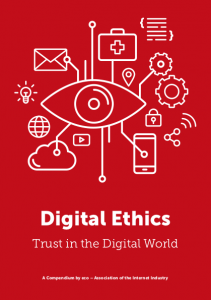- New Ethics Compendium as Internet industry contribution to the debate on digital ethics
- Internet companies taking responsibility: Self-regulation works
Digitalization continues to advance and evolve. There is great potential to be found in the use of algorithms and artificial intelligence and the handling of data, such as in the areas of the Internet of Things. At the same time, a multitude of ethical and legal questions arise. “We take these issues very seriously as an association and are of the opinion that ethical norms, guidelines for behavior, and finally legal framework conditions for the development and use of digital technologies should not simply be determined by the state, but rather in close alliance between companies, politics, and and the civil society,” says eco Chair Oliver J. Süme. Germany, and Europe as a whole, needs a discursive approach to questions of digital ethics.
With the eco Compendium on Digital Ethics, containing up-to-date expert opinions and specialist contributions on a range of issues relating to digital ethics, such as the focus themes of the State & Framework Conditions, Work, IT Security, and Education, the association wishes to make an initial contribution to this discourse.
Internet companies taking responsibility: Self-regulation works
eco emphasizes that many companies already take responsibility for ethical challenges relating to digital transformation and, for example, in the context of initiatives to self-regulate thus successfully contribute to the adherence to ethical norms. A prominent example here is the eco Complaints Office, which works to combat undesirable and illegal content online.
Süme only sees the need for new laws to enforce ethical standards in the area of digitalization, however, in isolated cases: “Already today, the Internet is no longer a legal vacuum – although time and again critics wish to assert this. In Germany, in particular, we already have corresponding legislation from the analog world for many cases of conflict that just needs to be applied to the digital world. I am therefore convinced: We do not need a flood of new legal framework conditions and regulations, but instead, we must simply adapt and apply our existing legal culture to the new technologies.”




